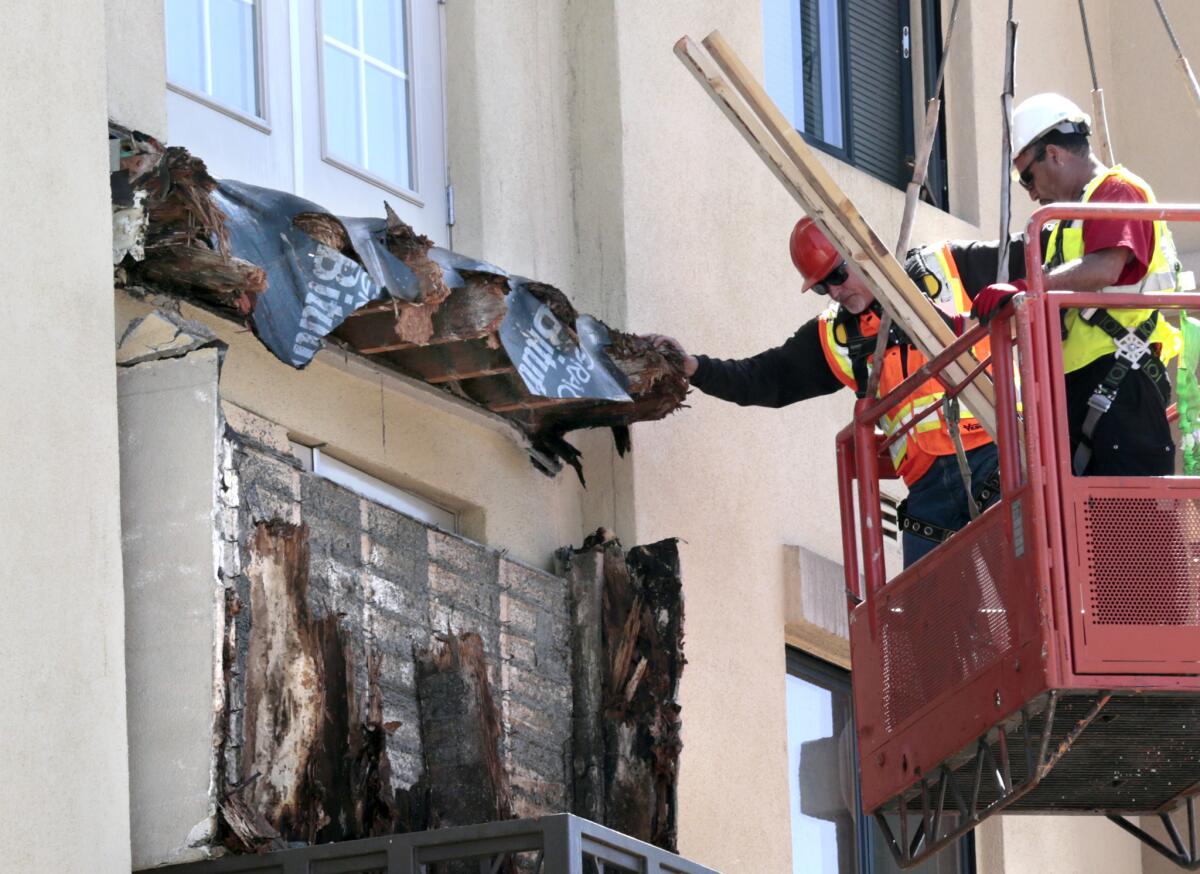Berkeley balcony collapse: lawmakers balk at forced settlement reporting

A crew works on the Berkeley apartment building where a balcony collapsed in mid-June, killing six people and injuring seven.
- Share via
Reporting from Sacramento — Citing concerns about voting for legislation they haven’t yet seen, lawmakers on Tuesday refused to support a bill that would have required building contractors to report lawsuit settlements to the state.
The emergency measure was crafted in the wake of the June 16 collapse of an apartment building balcony in Berkeley that killed six young people and gravely injured seven others. Berkeley city officials say the support beams were rotted, causing the balcony to give way.
While city officials and the Alameda County district attorney have launched their own investigations into the accident, the California Contractors State License Board is also mounting its own inquiry into the general contractor on the apartment complex eight years ago, Segue Construction.
An internal memo the licensing board provided to lawmakers in advance of Tuesday’s bill hearing states Segue was named as a defendant in at least 20 civil complaints in four counties since 1997. According to the memo, allegations against Segue included negligence, construction defect and property damage claims. The construction firm from 2012 to 2014 agreed to pay almost $23 million to release itself from liabilities in Santa Clara County for claims that appeared to be related to water damage to balconies, stairs and walkways.
Under the bill proposed by two Bay area lawmakers, state Sens. Jerry Hill (D-San Mateo) and Loni Hancock (D-Berkeley), a former mayor of Berkeley, Segue would have been required to report such settlements to the contractor licensing board.
“I can tell you that lives have been irreparably torn apart and it is the kind of thing we must take action to stop in the future,” Hancock said.
However, Hill began a Tuesday morning Assembly committee hearing on the bill by announcing that what lawmakers were to vote on was not the final product. He planned major changes to leave it to the licensing board to decide exactly what contractors must report and what in turn the board would do with those thousands of filings.
The legislation met fierce opposition from the construction industry, which warned that most settlements are made out of expedience to avoid even costlier litigation, and provide no information on whether there was actual damage or who was at fault.
Committee members speaking against the bill said they were concerned not enough is yet known about the cause of the Berkeley balcony collapse. “Should we not be looking at building inspectors? ... Where does construction stop and maintenance begin?” asked Assemblyman Bill Dodd (D-Napa), a former contractor.
“I just hate being rushed into making a decision that I don’t know the consequences of,” said Assemblyman Jim Wood (D-Healdsburg).
The Berkeley City Council is slated Tuesday evening to take up ordinances that would require building owners to inspect balconies every five years, and that they be built with rot-resistant wood. A City Council member also proposes that city inspectors periodically check apartment balconies.
More to Read
Sign up for Essential California
The most important California stories and recommendations in your inbox every morning.
You may occasionally receive promotional content from the Los Angeles Times.











